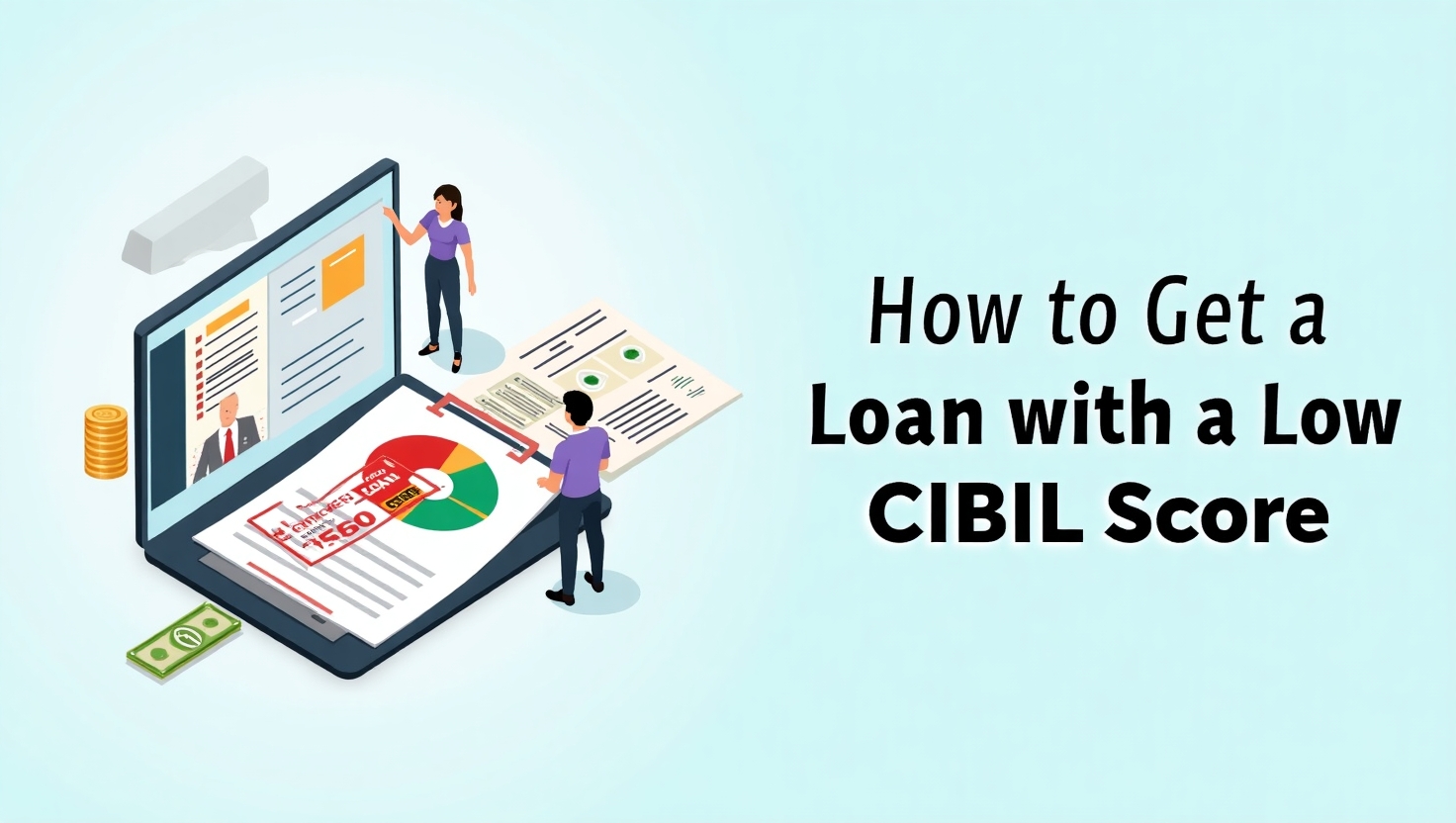
Can you get a loan with a low credit score? Many people wonder about this, and the answer is not straightforward. Knowing how to get a loan with a low cibil score is key for those needing financial help but have a bad credit history. A low cibil score can make it hard to get credit, but it’s not impossible.
To get a loan with a low credit score, you need to plan and do your research. You must understand cibil score loans and the options for those with low scores. In this article, we’ll look at how to boost your score or get a loan even with a low cibil score.
Key Takeaways
- Understanding cibil scores and their impact on loan approval is crucial
- There are options available for getting a loan with a low cibil score
- Improving your cibil score can increase your chances of securing a loan
- Researching and comparing different loan options is essential
- Securing a loan with low credit score requires careful planning and research
- Exploring alternative lending options can be beneficial
- Knowing how to get a loan with a low cibil score can help you make informed decisions
Understanding CIBIL Scores and Their Impact on Loan Approval
CIBIL scores are key in showing how trustworthy someone is with money. A low score can make it hard to get a loan. It’s important to know what affects these scores.
People with low scores might still get loans, but the terms might not be good. To get a loan, knowing why scores are low is crucial. This includes late payments, using too much credit, and defaulting on loans.
What Constitutes a Low CIBIL Score
A score under 650 is usually seen as low. This can happen for many reasons, like paying late or using too much credit. If you’re trying to get a loan with a poor credit score, fixing these issues is key.
Why Banks Consider CIBIL Scores Important
Banks look at CIBIL scores to decide if they should lend money. A low score might mean higher interest rates or no loan at all. Knowing how CIBIL scores work can help improve your chances of getting a loan.
Common Reasons for Low CIBIL Scores
- Late payments
- High credit utilization
- History of defaults
Fixing these common problems can help improve your credit score. This makes it easier to get a loan, even with bad credit loan options.
Essential Documents Required for Low CIBIL Score Loan Applications
When you apply for loans with a low credit score, having the right documents is key. You’ll need identity proof, income proof, address proof, and bank statements. These documents help improve your chances of getting the loan.
Before applying, make sure your credit report is correct. If there are errors, fix them. Explain any unexpected financial issues to the lender. This can help them understand your situation.
Here are the documents you’ll usually need for a loan application:
- Identity proof: passport, PAN card, or driver’s license
- Income proof: salary slips, income tax returns, or form 16
- Address proof: utility bills, rent agreement, or passport
- Bank statements: recent bank statements to show financial stability
Having these documents ready and a correct credit report boosts your loan approval chances. It also helps improve your credit score for future applications.
Always check with the lender for specific document needs. Requirements can change based on the loan type and your situation.
Types of Loans Available for Low CIBIL Score Holders
People with low CIBIL scores have many loan options. Knowing about these can help them choose wisely. It’s key to look at all options when it comes to low cibil score loan eligibility.
Loans are mainly secured or unsecured. Secured loans need collateral, like a house or car. They often have better rates and bigger amounts. Unsecured loans don’t need collateral but have higher rates because of the risk.
For those with low CIBIL scores, wondering how to get a loan, there are other ways. Options like peer-to-peer lending, microfinance, and digital platforms are available. These might have easier rules, helping those with low scores get loans.
Here are some key loan options to consider:
- Secured loans: Offer better interest rates and higher loan amounts, but require collateral.
- Unsecured loans: Do not require collateral, but may come with higher interest rates.
- Alternative financing solutions: Provide more flexible eligibility criteria, making it easier for individuals with low CIBIL scores to secure a loan.
Understanding the different loans and what they need can help those with low CIBIL scores. This way, they can find a loan that fits their needs.
| Loan Type | Interest Rate | Collateral Required |
|---|---|---|
| Secured Loan | Lower | Yes |
| Unsecured Loan | Higher | No |
| Alternative Financing | Varies | No |
How to Get a Loan with a Low CIBIL Score: Step-by-Step Guide

Getting a loan with a low credit score can be tough. But, with the right steps, it’s doable. First, check your cibil score and report to see where you stand.
Then, pick the right loan and lender. Look at interest rates, repayment terms, and what you need to qualify. Loans for people with low scores are a good option.
Here’s what to do:
- Check your cibil score and report
- Choose the right type of loan and lender
- Prepare all necessary documents
- Apply for the loan, either online or offline
Be truthful about your credit history. Explain any bad marks on your report. By doing these steps, you boost your chances of getting a loan with a low score.
Always read the loan terms carefully before agreeing. With the right steps and patience, you can get a loan with a low cibil score. This helps you start fixing your credit.
Know Your CIBIL Score Instantly – Check for Free Before Applying for a Loan!
Exploring Secured Asset Options to Increase Approval Chances
Looking into secured asset options can help when you have a low CIBIL score. These assets can act as collateral, making lenders feel safer. This safety boost can increase your chances of getting a loan, even with bad credit.
One common collateral is property. If you own a home, you can use it to secure a loan. This can help you get financing even with a low credit score.
Property as Collateral
Using your property as collateral is a smart move if you own real estate. The lender will check the property’s value to decide how much you can borrow. This method can be used for many needs, like paying off debts or buying big items.
Fixed Deposits and Investments
Fixed deposits and investments can also be used as collateral. These assets are easy to turn into cash if needed. This makes them safer for lenders, which can lead to better loan terms for you.
Gold and Jewelry Options
Gold and jewelry can be collateral for short-term loans. They’re often used for quick cash needs. Exploring these options can help you get approved for loans, even with bad credit.
Finding the Right Co-applicant or Guarantor
When getting a loan with poor credit, having a co-applicant or guarantor can help a lot. A co-applicant shares the loan responsibility, while a guarantor is responsible if you can’t pay. Look for someone with good credit, stable income, and a strong bond with you.
Here are some key factors to consider when finding a co-applicant or guarantor for loans for low credit rating:
- Credit score: A good credit score can strengthen your loan application
- Income stability: A stable income ensures the co-applicant or guarantor can repay the loan if needed
- Relationship: A close relationship with the borrower can help establish trust and responsibility
In summary, finding the right co-applicant or guarantor requires careful consideration. Look at their financial situation and relationship with you. This way, you can boost your chances of getting loans for low credit rating and reach your financial goals.
| Co-applicant/Guarantor | Credit Score | Income Stability | Relationship |
|---|---|---|---|
| Family Member | Good | Stable | Close |
| Friend | Fair | Unstable | Distant |
| Colleague | Excellent | Stable | Professional |
Alternative Lending Platforms and NBFCs
For those with low CIBIL scores, traditional banks might not be the best choice. But, there are other options like alternative lending platforms and non-banking financial companies (NBFCs). These can offer loans with more flexible criteria, helping to improve your credit score.
Some of the alternative lending options include:
- Peer-to-peer lending platforms, which connect borrowers with investors
- Microfinance institutions, which provide small loans to individuals and small businesses
- Digital lending platforms, which offer quick and easy loan applications
Benefits of Alternative Lending
Alternative lending platforms can be great for those with low CIBIL scores. They often have easier eligibility rules. This can help more people get loans, even if traditional banks say no.
Things to Consider
It’s important to look closely at the terms and conditions of alternative loans. The interest rates might be higher, and there could be extra fees. Knowing what you’re getting into can help you make better choices and improve your credit score over time.
Strategies to Improve Your CIBIL Score Before Applying

Boosting your CIBIL score can make it easier to get a loan, even with a low score. Knowing what affects your score is key. Your credit history, which makes up 30% of your score, is a big factor.
Getting a loan with low credit score is tough, but there are ways to up your chances. Paying off debts and lowering your credit use can quickly up your score. Also, avoiding new credit checks and keeping up with payments helps your score grow.
Quick Credit Enhancement Methods
- Paying off outstanding debts to reduce credit utilization
- Avoiding new credit inquiries to prevent negative impacts on your score
- Monitoring your credit report for errors and disputing them if necessary
Long-term Credit Building Tactics
For a big score boost, long-term plans are essential. Keep up with payments, mix up your credit types, and keep your credit use low. These steps can help you get a loan even with a low CIBIL score and better your financial health.
Improving your CIBIL score takes time and effort, but it’s worth it. By understanding and improving the factors that affect your score, you can get a loan with a low CIBIL score. This will help you reach your financial goals.
Common Mistakes to Avoid During Loan Application
When you’re looking for bad credit loan options, it’s key to steer clear of common blunders. One big mistake is applying for too many loans at once. This can hurt your credit score. Another error is not checking your credit report. This can lead to wrong info and lower approval chances.
To boost your chances for low credit score financing, know these mistakes to avoid:
- Providing incomplete or inaccurate documentation
- Not researching and comparing different loan options
- Not considering alternative lending platforms or NBFCs
By dodging these common mistakes, you can up your chances of getting a loan. Always check your credit report, give accurate info, and look at various loan options. This way, you’ll find the best one for you.
Tips for Negotiating Better Loan Terms Despite Low Credit
Getting a loan with poor credit means you need to negotiate well. Understanding the lender’s view and being ready to talk is key. Show a stable income to prove you can pay back the loan.
Loans for those with low credit scores might have tough terms. But, you can still try to get better ones. Compare rates from different lenders to find the best deal. Also, offering collateral can get you a lower interest rate.
Interest Rate Negotiation Strategies
- Research and compare interest rates from different lenders
- Highlight a stable income and employment history
- Offer collateral to secure a better interest rate
Repayment Term Flexibility Options
You can also talk about making payments easier. Ask for longer loan terms or a step-up EMI plan. This makes the loan more doable and lowers the chance of default.
Conclusion: Taking Action to Secure Your Loan
Getting a loan with a low CIBIL score might seem tough. But, with the right steps and determination, it’s possible. You can find ways to get a loan by looking at secured loans and other lending options. Improving your credit score also helps a lot.
Don’t let a low CIBIL score stop you from reaching your financial dreams. Stay updated, be smart, and take action. This way, you can move closer to your goals, bit by bit.
Looking for a personal or business loan? The key is to plan carefully. This guide can help you get approved and maybe even get better loan terms. Start now and get the funding you need to reach your financial goals.
When you take out a loan, figuring out how to calculate emis and pick the right loan term is key. The loan term affects your monthly payments a lot. Knowing how to calculate emis is crucial for your financial health. So, how do you pick a loan term that fits your budget? READ MORE ABOUT IT FROM HERE – How to Calculate EMIs and Choose the Right Loan Tenure
How to Get a Loan with a Low CIBIL Score
: FAQ
What constitutes a low CIBIL score?
A CIBIL score below 650 is considered low. Scores range from 300 to 900. A score below 650 can make it hard to get a loan.
Why do banks consider CIBIL scores important?
Banks use CIBIL scores to check if lending to someone is risky. A low score means there’s a higher chance of not getting paid back. This can lead to less favorable loan terms or even a loan denial.
What are the common reasons for low CIBIL scores?
Low CIBIL scores often come from late payments, high credit use, defaults, or no credit history. Knowing why your score is low is key to improving it.
What essential documents are required for low CIBIL score loan applications?
For a loan with a low CIBIL score, you’ll need ID, income proof, address proof, and bank statements. Explaining your low score can also help lenders understand your situation.
What types of loans are available for low CIBIL score holders?
People with low CIBIL scores can get secured, unsecured loans, or alternative financing. Each option has its own benefits and drawbacks. It’s important to know the criteria and terms before choosing.
How can I improve my chances of getting a loan with a low CIBIL score?
To get a loan with a low CIBIL score, consider using collateral, finding a co-applicant, or exploring alternative lenders. Improving your score by paying off debts and making consistent payments also helps.
What common mistakes should I avoid during the loan application process?
Avoid applying for many loans at once, not checking your credit report, and providing wrong information. Knowing these mistakes can help you get your loan approved.
How can I negotiate better loan terms despite having a low CIBIL score?
To get better loan terms with a low CIBIL score, show stable income, offer collateral, and compare rates. Negotiating interest rates and flexible repayment options can also help.







